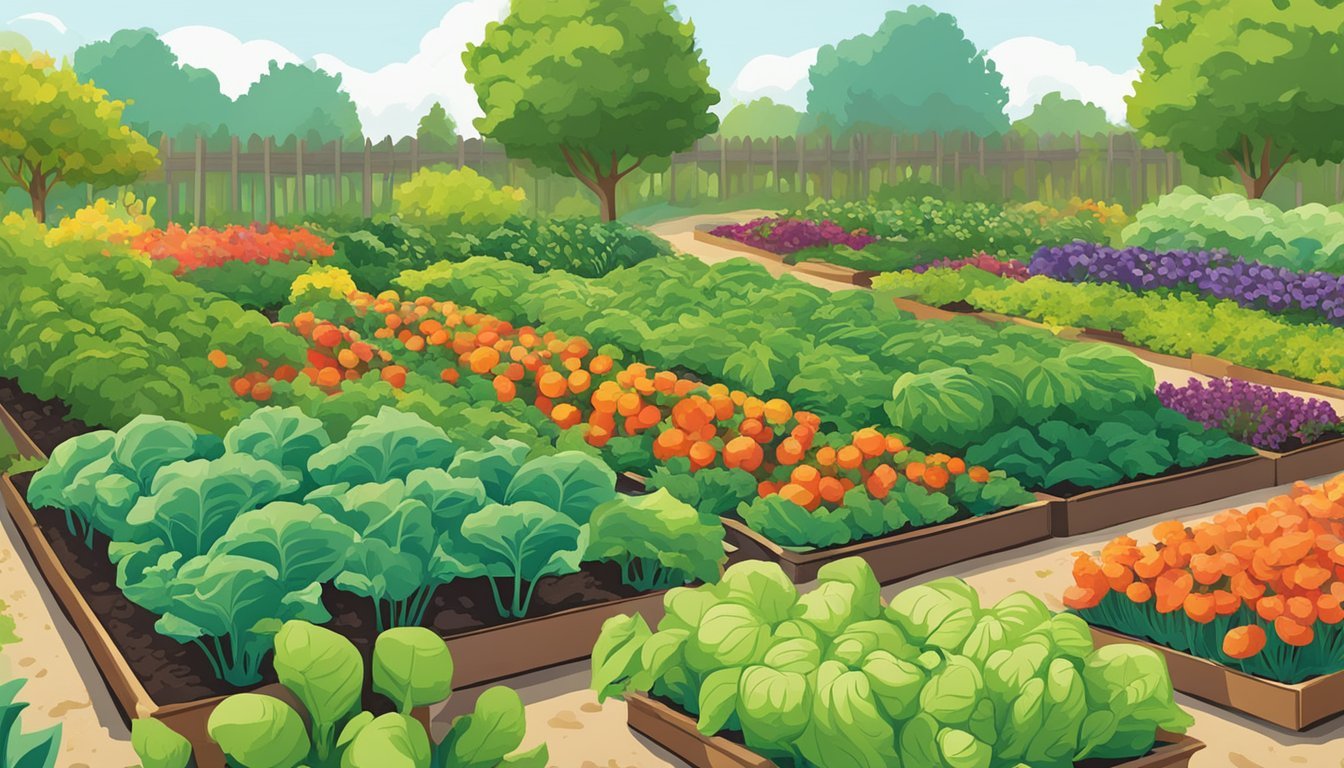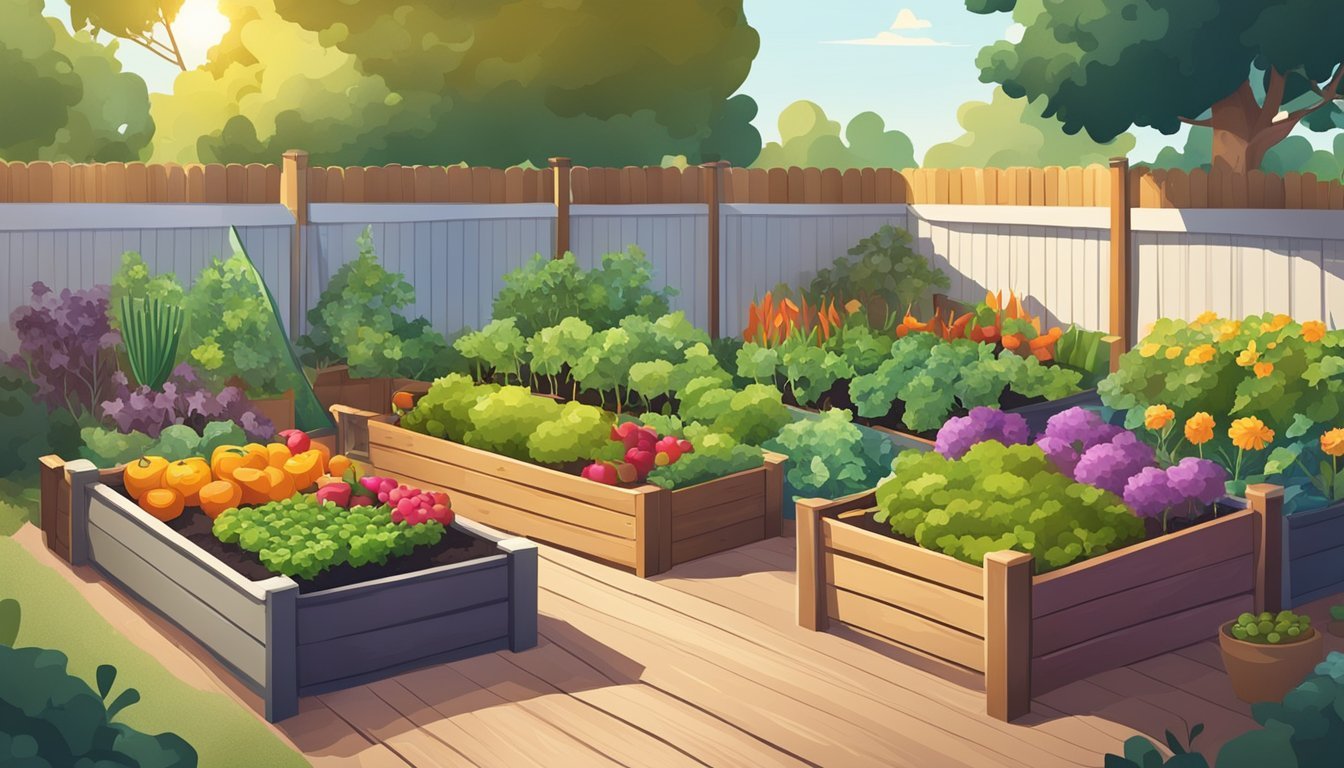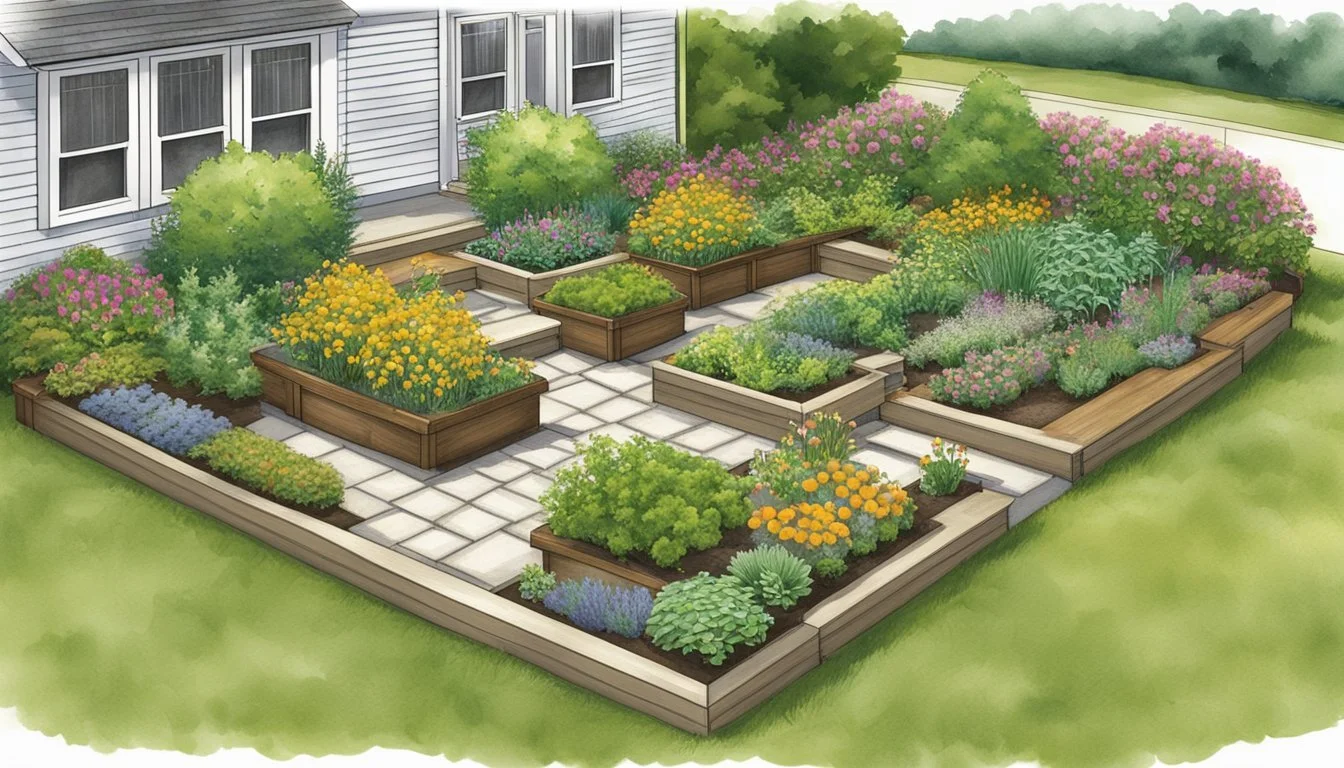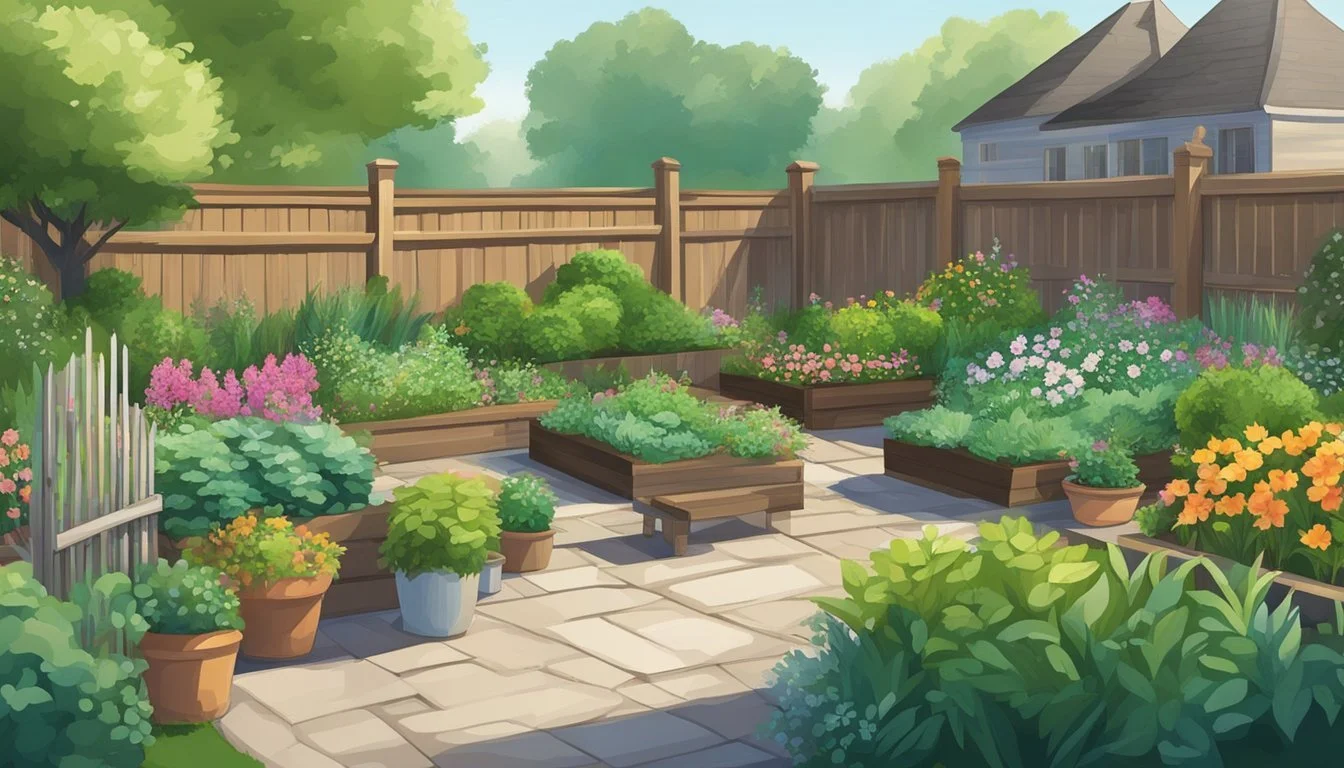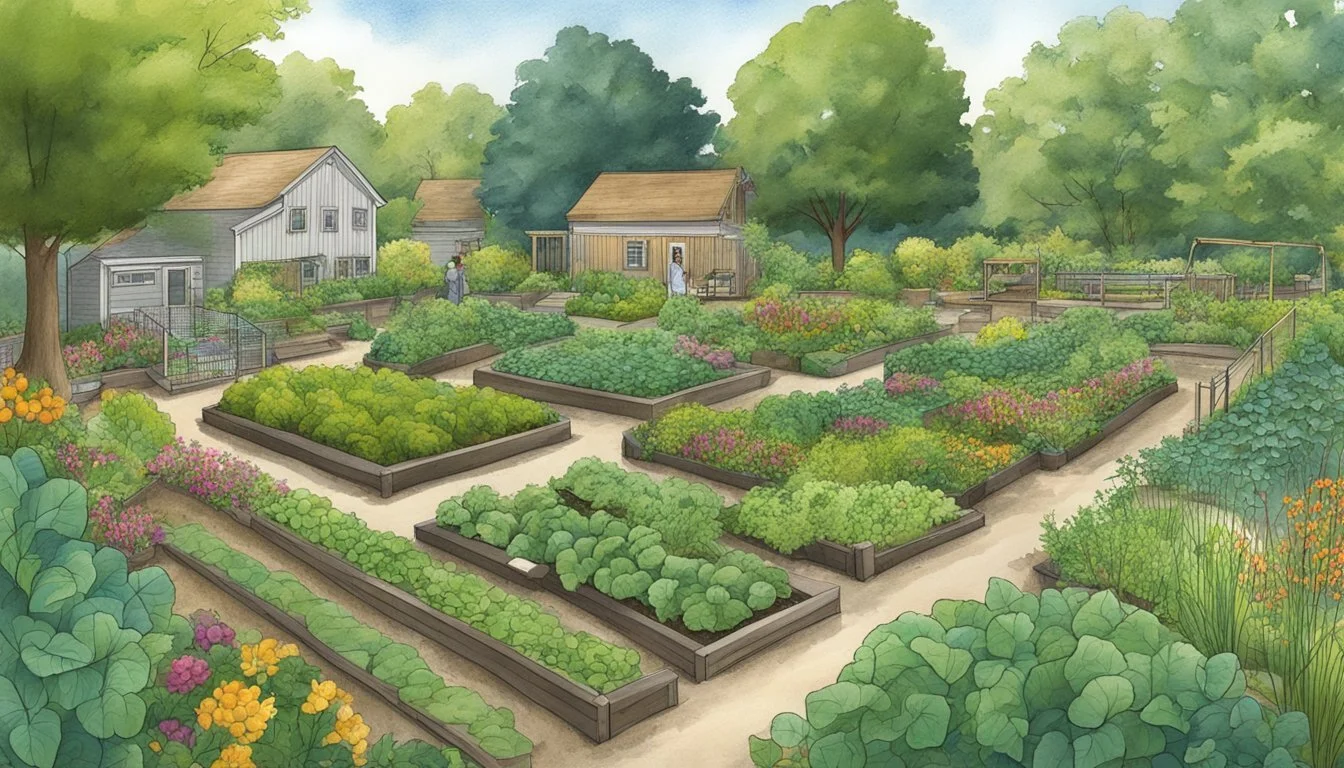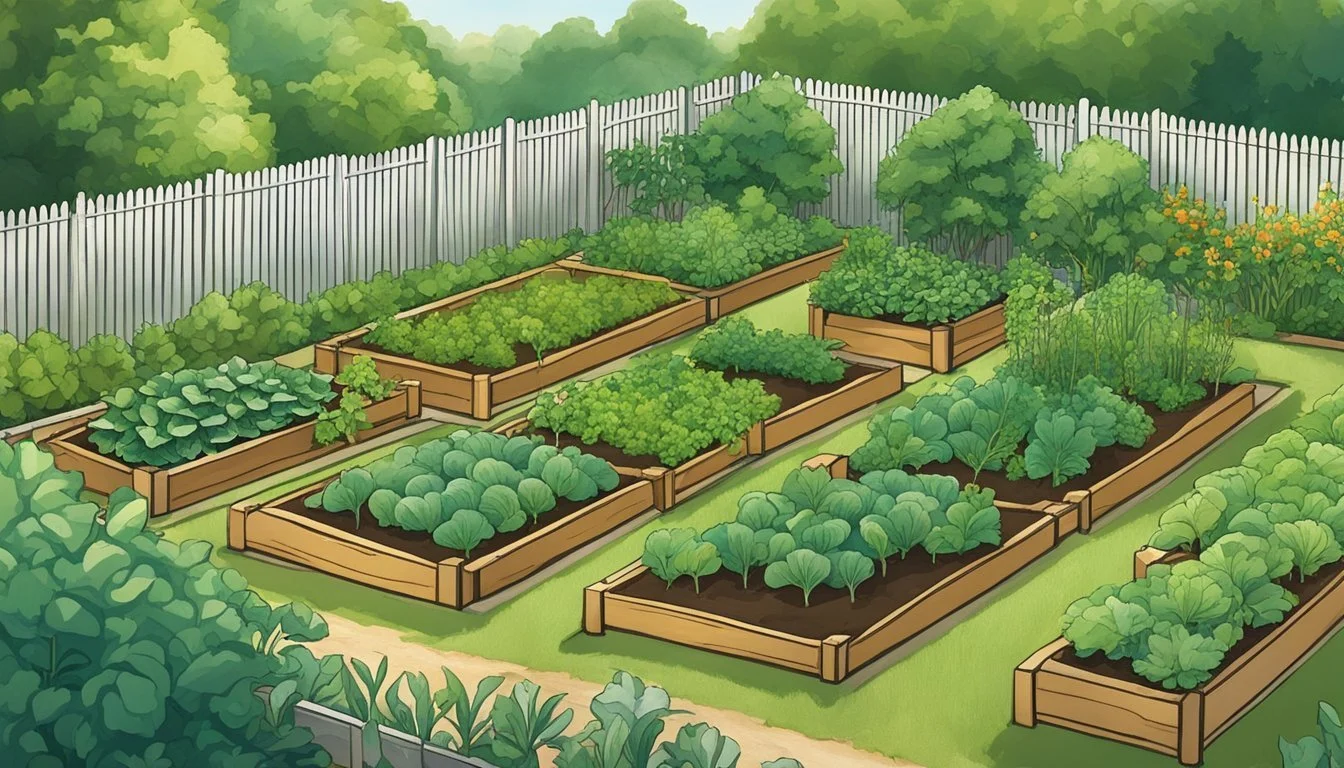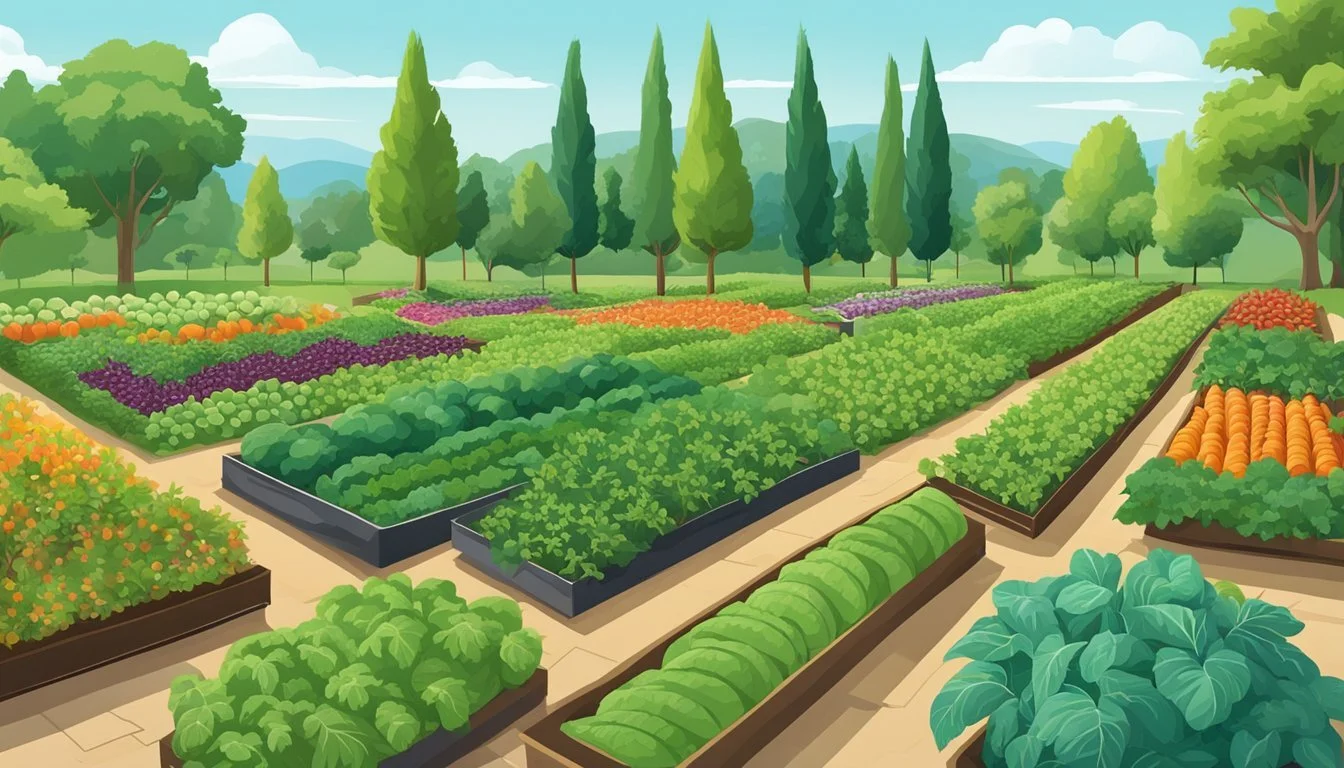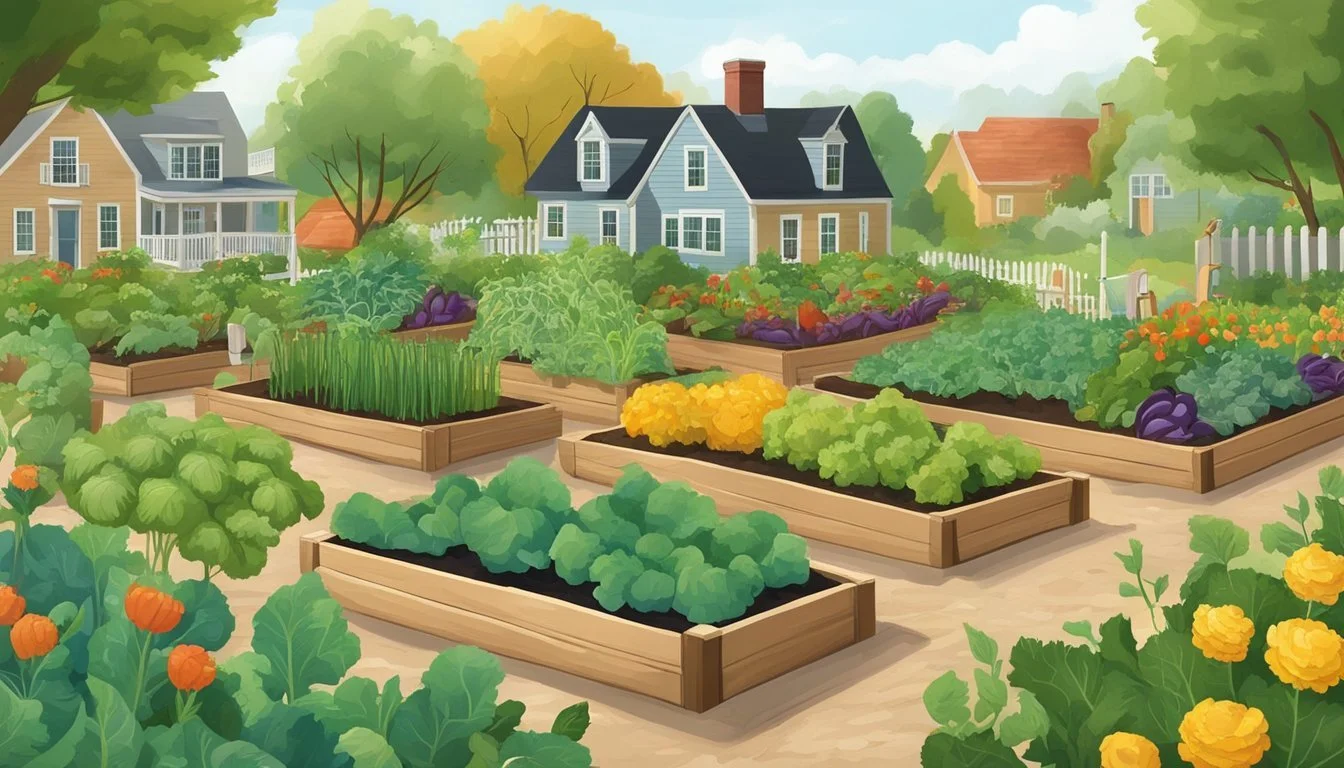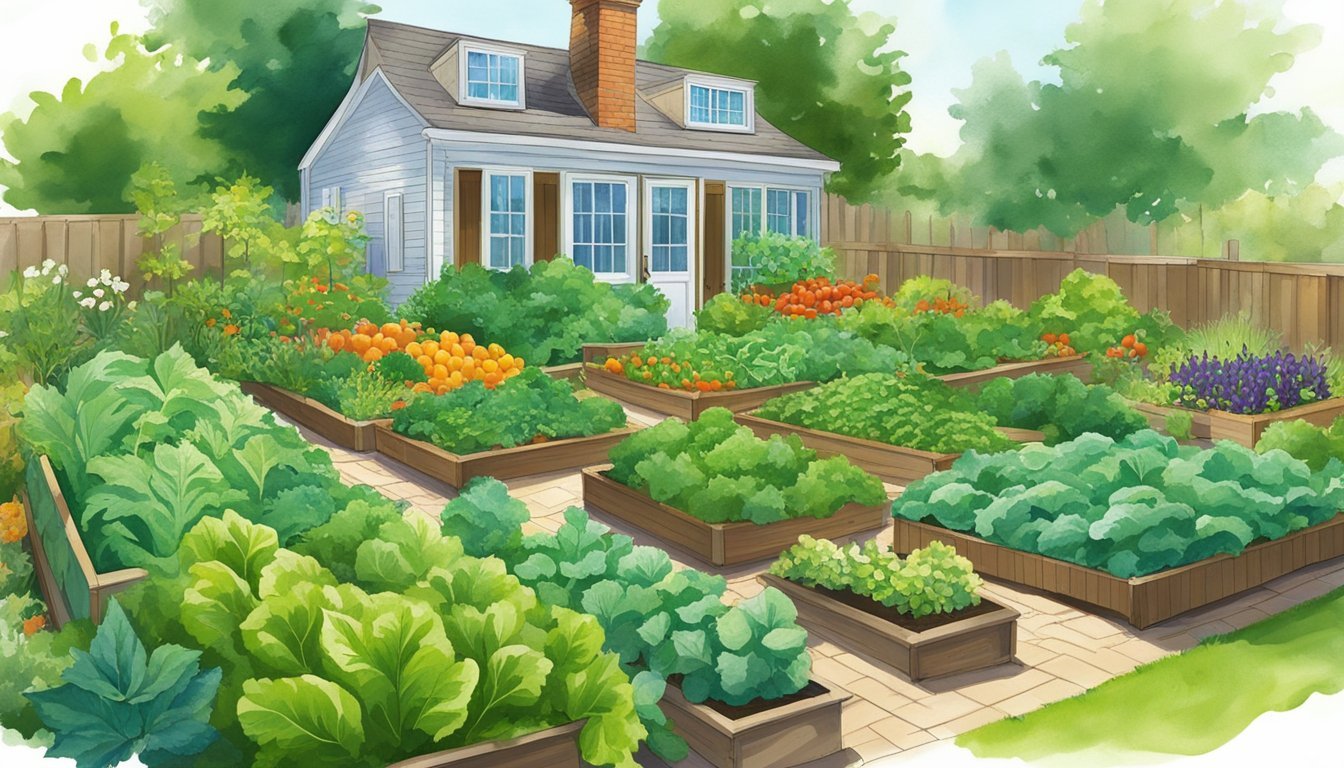Vegetable Gardening in Delaware
A Guide to Thriving Produce
This Article is Part of Our Guide on Vegetable Gardening by State
Vegetable gardening in Delaware offers a rewarding experience for those who seek to cultivate their own food. The state's moderate climate, ranging from USDA plant hardiness zones 5-7, provides a conducive environment for a variety of vegetables to flourish. Gardeners in Delaware can take advantage of the distinct seasons by planting cold-hardy vegetables in the early spring and fall, and heat-loving crops during the warmer months.
Understanding the local frost dates is crucial for Delaware gardeners to optimize their growing season. The last frost in spring and the first frost in autumn serve as important benchmarks for planting schedules. Early spring is ideal for sowing seeds (how long do seeds last?) of cool-season crops, while the warmer temperatures of late spring allow for the transition to plants that require more heat. Additionally, the state's soil tends to be rich and can be further improved with compost and proper preparation, ensuring vegetables have the nutrients they need to grow.
Delawareans have a wide range of vegetables to choose from for their gardens. From the robust performance of leafy greens like lettuce during the cooler transitions of spring and fall to the favorable growth of root vegetables that can withstand the variable conditions, the options are plentiful. Vegetables such as tomatoes, peppers, and cucumbers (how long do cucumbers last?) thrive in the summer warmth, making vegetable gardening in Delaware a versatile and engaging endeavor throughout the various seasons.
Planning Your Vegetable Garden
Creating a successful vegetable garden in Delaware begins with an understanding of the local climate and selecting vegetables that thrive in this environment. It's crucial for gardeners to consider their area's USDA plant hardiness zones, as well as the typical first and last frost dates.
Understanding Delaware's Climate
Delaware falls within USDA plant hardiness zones 5-7, which means the growing conditions can vary significantly across the state. To maximize the yield from one's garden, it's important to acknowledge these zones and plan accordingly. The local weather patterns, including frost dates, should govern the planting schedule. For Delaware, gardeners should note the following frost dates:
Last Frost Date: Varies from early April to late May
First Frost Date: Typically occurs between late September and early November
These frost dates act as bookmarks for the growing season, so adhering to them is essential.
Selecting Suitable Vegetables
The vegetables chosen must be compatible with Delaware's soil and climate. Here is a short list of vegetables that are known to grow well in Delaware's varying conditions:
Lettuce: A cold-hardy vegetable suitable for early spring and fall planting.
Collard Greens: Thrive in the cooler temperatures of Delaware's spring.
Green Peas: Enjoy the moderate spring weather of the state.
Kale: Can be planted during the spring for a crop that endures until the first frost.
To further assist with planning, gardeners can consider the following spacing and depth guidelines:
Vegetable Spacing (inches) Depth (inches) Lettuce 12-15 1/4 to 1/2 Collard Greens 18-24 1/4 to 1/2 Green Peas 18-24 1 to 1 1/2 Kale 18-24 1/4 to 1/2
By selecting the right vegetables and adjusting the planting schedule to Delaware's unique growing conditions, gardeners can set the stage for a bountiful harvest.
Garden Design and Layout
In Delaware, selecting the right garden design and layout is essential for making the most of the available space and resources. Whether one has a sprawling backyard or a modest urban balcony, various gardening techniques can optimize production and enhance aesthetic appeal.
Raised Garden Beds
Raised garden beds offer a structured and efficient way to cultivate vegetables. By elevating the soil level, these beds provide improved drainage and soil quality. Design should consider bed heights to be ergonomic, limiting the need for excessive bending and reaching. A bed width of 3 to 4 feet allows for easy access from all sides. In smaller gardens or urban settings, raised beds maximize productivity by permitting a concentration of resources in a confined space.
Container Gardening
Container gardening is ideal for individuals with limited space, such as balconies or patios. Containers can range from traditional pots to more creative vessels like old barrels or recycled materials. It's imperative to ensure proper drainage with holes at the bottom and to select the right container sizes to accommodate the growth of specific vegetables. This gardening style allows for a personalized touch, as gardeners can choose containers that fit their aesthetic preferences and practical needs.
Vertical Gardening
Vertical gardening embraces the vertical plane to grow vegetables, which can be particularly beneficial in small garden spaces. Techniques include using trellises, wall planters, and hanging baskets. This method not only saves space but can also turn a bare wall or fence into a lush and productive garden area. Vertical gardening suits crops like beans, peas, and some kinds of squash and tomatoes, which naturally grow upwards and can benefit from vertical support structures.
In Delaware, gardeners can employ these methods individually or in combination to create a functional and beautiful vegetable garden tailored to their unique urban or rural environments.
Soil Preparation and Management
Preparing the soil is a critical step for successful vegetable gardening in Delaware. Gardeners should evaluate soil moisture before beginning; soil that sticks or rolls indicates excess moisture. To test, compress soil in the palm; optimal soil crumbles and breaks into small clumps.
Soil types in Delaware vary, with sandy soils in Sussex County and clayey soils in northern Delaware. Both types benefit from the addition of organic matter. In sandy areas, organic matter enhances water and nutrient retention, while in clayey soils, it improves drainage by binding clay particles into aggregates.
Drainage is crucial for preventing root diseases and promoting healthy plant growth. Gardeners are advised to mix in compost or aged manure to not only enrich the soil with nutrients but also to ensure it drains well. Deep loosening of soil, recommended to at least 8 inches, allows roots to extend downward and access water and nutrients.
For gardeners in Delaware, conducting soil tests is instrumental in understanding soil composition and nutrient levels. Research-backed guidance from local extensions can tailor soil management practices to Delaware's conditions. Here's a brief guideline:
Soil Test: Essential to determine pH and nutrient levels.
Organic Matter: Incorporate to improve soil structure and fertility.
Loosening Depth: Aim for at least 8 to 12 inches for root development.
Moisture Check: Soil should crumble, not stick or roll.
Adhering to these practices, gardeners can create a robust foundation for their vegetable gardens to thrive throughout the growing season.
Choosing the Right Vegetables for Delaware
Delaware's climate, with its chilly springs and autumns, complemented by hot summers, guides gardeners in selecting vegetables that will thrive throughout the year. Specific cold-hardy and warm-season vegetables are best suited for the state’s growing conditions.
Cold-Hardy Vegetables
Cold-hardy vegetables can withstand Delaware's cooler temperatures and are ideal for early spring and late fall planting. They include:
Lettuce: Varieties like Butterhead and Boston can survive light frost and even snow, making them a top choice for Delaware gardens.
Spinach: This leafy green is robust and can germinate in cold soil, perfect for early planting.
Kale: Kale is highly frost-resistant and its flavor is even enhanced after a light frost.
Peas: They can be planted as soon as the soil is workable and handle cool temperatures well.
Radishes: Known for their quick growth, radishes can be harvested before the summer heat.
Carrots: These root vegetables can endure cold soil and mature in a cooler climate.
Warm-Season Vegetables
Warm-season vegetables thrive in Delaware's hot summers and should be planted after the danger of frost has passed:
Tomatoes: Require warmth and a well-drained soil, typically planted after the last expected frost.
Squash: Both summer and winter varieties need the warm soil of late spring to flourish.
Cucumbers: They prefer warmer temperatures and should be planted when the soil is sufficiently heated.
Collard Greens: These can be started in the summer to mature in the mild fall weather.
Green Beans: Plant these when the soil is warm for best germination and growth.
Planting Strategies
Successful vegetable gardening in Delaware requires strategic planting, taking into consideration the state's varying first and last frost dates. Gardeners can maximize their harvest by starting seeds indoors or sowing directly outdoors at the right time, ensuring that plants thrive in their given conditions.
Seed Starting Indoors
Gardeners should start certain vegetable seeds indoors before the last frost to extend their growing season. Delaware's last frost date typically falls between April 15th and May 15th, varying by specific location within the state's planting zones. Starting seeds indoors should occur approximately 6-8 weeks before the anticipated last frost date. This allows seedlings to mature enough to withstand the transition to outdoor conditions. For instance, tomatoes and peppers are common transplants that benefit from being started indoors. A simple schedule can be outlined as follows:
Vegetable Indoor Start Date Expected Transplant Date Tomatoes March 1st May 1st Peppers February 15th May 1st
By adhering to a calendar, gardeners can facilitate the growth of robust, healthy transplants ready for the upcoming season.
Direct Sowing Outdoors
When it comes to sowing seeds directly outdoors, one must account for the soil temperature and the likelihood of a hard freeze, which is defined as temperatures at or below 28°F (-2°C). Gardeners must wait until after the last frost date to sow seeds of frost-sensitive crops. Plants such as beans, corn, and squash are typically planted directly into the ground. They require warmer soil and do not transplant as well as other crops. An example planting schedule for direct sowing might be:
Vegetable Direct Sow Date Beans After May 15th Corn After May 15th Squash After May 20th
On the other hand, certain vegetables like peas and lettuce can be sown earlier, as they can tolerate cooler conditions. Gardeners should consider the specific needs of each crop for optimal results.
Maintenance and Care
To ensure a successful vegetable garden in Delaware, gardeners need to focus on three critical aspects of maintenance and care: watering, mulching and weeding, and managing pests and diseases.
Watering Requirements
Vegetable gardens require consistent watering. Water is essential for plant health, but the amount and frequency will vary depending on the plant species and weather conditions. Generally, a weekly soaking that allows water to penetrate deeply into the soil is preferable to light, frequent watering. Delaware's climate necessitates close attention to watering during the drier months.
Tables for Watering
To aid in understanding, consider the following general watering guide:
Vegetable Type Water per Week (Inches) Root Vegetables 1.0 - 1.5 Leafy Greens 1.5 - 2.0 Fruit Vegetables 1.0 - 2.0
Mulching and Weeding
Mulching serves multiple purposes; it maintains soil moisture, keeps the temperature stable, and suppresses weeds. Organic mulches, such as straw or wood chips, should be applied around the base of plants. Regular weeding ensures that vegetables are not competing for nutrients and can help to prevent disease.
Mulch Application
Apply a 2 to 3-inch layer of mulch around plants.
Avoid placing mulch directly against plant stems to reduce the risk of rot.
Pest and Disease Management
Pests and diseases can quickly jeopardize a vegetable garden. Practices such as crop rotation and proper spacing can minimize disease spread. For pest control, gardeners should regularly inspect plants for signs of insects or other pests and apply appropriate control methods, which may include nets, barriers, or rodent sprays when necessary.
Pest Control Strategies
Use netting to protect plants from bird damage.
Introduce beneficial insects like ladybugs to control aphid populations.
Apply rodent repellent sprays cautiously, following the manufacturer's guidelines.
Avoiding overwatering and ensuring good air circulation around plants can also reduce the vulnerability to diseases. Remember, a preventative approach is often the best method to maintain plant health.
Wildlife Management
Effective wildlife management in vegetable gardens requires strategic approaches to mitigate the impact of mammals and insects. Specific tactics tailored to each type of pest ensure a healthy, productive garden.
Dealing with Mammals
In Delaware, mammals such as deer, rabbits, and squirrels pose a challenge to gardeners. They often find vegetable gardens an attractive source of food, leading to significant crop damage.
Deer: A robust fence at least 8 feet tall can prevent deer from entering gardens, as physical barriers are one of the most effective deterrents.
Rabbits: To thwart rabbits, gardeners should install fencing that extends underground to prevent digging.
Squirrels: Squirrels require a more dynamic approach, including securing seedlings with nets and removing any potential food sources like fallen fruits or nuts (how long do nuts last?).
Insect Control
Managing insects like aphids and slugs is crucial for protecting vegetable gardens. Careful monitoring and non-toxic interventions help maintain the ecological balance and avoid harm to beneficial insects.
Aphids: Introducing beneficial predators such as ladybugs can naturally control aphid populations. For severe infestations, a soft soap spray may be used directly on the aphids.
Slugs: Slugs can be managed through handpicking at night or by setting up traps. Barrier methods with copper strips or diatomaceous earth also prove to be effective at keeping slugs out of plant beds.
Harvesting and Storage
Harvesting in Delaware's vegetable gardens requires attention to timing to ensure vegetables are picked at peak freshness. They generally collect leafy greens like spinach early in the morning to retain their crispness. Root crops, such as carrots and potatoes, can be harvested when the soil is dry to prevent mud from clinging to the produce.
For successful storage, gardeners categorize vegetables into perishable and less perishable groups. They store perishable items, such as tomatoes and cucumbers, at cool room temperatures promptly after harvest to maintain freshness. Less perishable vegetables, like potatoes and onions, are cured first and then stored in a cool, dark place.
Here is a basic guide for gardeners on harvesting some common vegetables and their subsequent storage methods:
Leafy Greens (e.g., lettuce, spinach):
Harvest: When leaves reach desired size
Storage: Refrigerate in plastic bags, consume within 1-2 weeks
Root Vegetables (e.g., carrots, beets):
Harvest: When roots are of adequate size
Storage: Remove tops, store in a cool, humid place
Fruiting Vegetables (e.g., tomatoes, peppers):
Harvest: When they reach full color and firmness
Storage: On countertops away from direct sunlight
Alliums (e.g., onions, garlic):
Harvest: When tops fall over and brown
Storage: Cure for several weeks, then store in a mesh bag in a dry location
Gardeners also consider the use of root cellars for long-term storage of hardy vegetables. They ensure that the cellar maintains consistent humidity and temperature to minimize spoilage and maximize the longevity of the harvest.
Extending the Growing Season
To ensure a successful and extended vegetable gardening season in Delaware, gardeners can utilize structures that protect plants from early frost and extreme heat. By incorporating cold frames and hoop houses as well as greenhouses, they can potentially achieve a garden that can be harvested all year.
Cold Frames and Hoop Houses
Cold frames provide a microclimate that shields plants from cold winds and frost, enabling gardeners to start planting earlier in the spring and extend growing into the fall. Typically constructed with a transparent lid, cold frames can be used to harden off seedlings or protect cold-hardy vegetables during moderate freezes.
Materials: Utilize materials like polycarbonate or old windows for lids.
Cold-Hardy Crops: Ideal for spinach, kale, and lettuce.
Hoop houses, on the other hand, are tunnel-like structures covered with plastic sheeting. They provide a more substantial shelter from the elements and can be used throughout the entire growing season.
Installation: Erect hoops over garden beds and cover with a durable plastic.
Benefits: Extend growing seasons, protect from extreme heat, and shelter from heavy rains.
Ventilation: Include openings or roll-up sides to regulate temperature.
Greenhouses
Greenhouses offer the most controlled environment for vegetable growing, allowing gardeners to manipulate both temperature and humidity. They can protect plants from Delaware's winter frosts to enable a year-round growing season.
Construction: Often made with glass or clear plastic, and a sturdy frame.
Temperature Control: It's crucial to monitor and adjust the temperature inside to avoid damage from overheating.
Versatility: They can house a variety of plants, from seedlings to mature plants, and are especially useful for starting seeds early before transplanting outside.
Additional Gardening Tips
In Delaware's varied climate, adopting strategic gardening practices can greatly enhance the health and yield of your vegetable garden. These tips focus on companion planting, the timing of succession planting, and understanding the impact of cross-pollination.
Companion Planting
Companion planting involves pairing certain plants together to enhance growth, deter pests, or attract beneficial insects. For example, marigolds are excellent companions for vegetable crops as their strong scent repels many garden pests. Additionally, flowering companions are valuable for attracting cross-pollinators, which are essential for fruit-producing plants.
Beneficial Combinations:
Tomatoes with basil – Improves flavor and deters flies and mosquitoes.
Carrots with onions – The strong scent of onions deters carrot flies.
Cucumbers with nasturtiums – Nasturtiums attract aphids away from cucumbers.
Succession Planting
Succession planting ensures a continuous harvest throughout the growing season. By timing plantings a few weeks apart, gardeners can prevent a glut of crops and instead enjoy a steady supply.
Succession Planning Table:
Crop First Planting Second Planting Notes Lettuce Early March Late March Prefers cooler spring temperatures. Bush Beans Mid-May Early June Plant second crop after first harvest. Spinach Early April Mid-April Quick to mature; perfect for spring and fall.
Cross-Pollination
Cross-pollination is critical for the fertility of many crops, especially those producing fruit. For successful fruit set in vegetables such as squash and cucumbers, gardeners should encourage cross-pollinators like bees into their garden. However, be aware that cross-pollination between differing varieties can affect the purity of seed strains for seed-saving purposes.
Tips for Encouraging Cross-Pollinators:
Plant a variety of flowers throughout the garden to attract bees and other pollinators.
Avoid pesticides that can harm these beneficial insects.
Incorporate meadows or wildflower strips nearby to provide additional habitat for pollinators.
Local Gardening Resources
Delaware residents have access to a wealth of gardening resources that can assist them in starting or maintaining a successful vegetable garden. These resources offer invaluable information, expert advice, and community support.
Extension Offices
University of Delaware Cooperative Extension
New Castle County: Offers guidance on vegetable gardening, located at (302) 831-8862.
Kent County: Support for gardeners in Dover and surrounding areas can be reached at (302) 730-4000.
Sussex County: Based in Georgetown, their extension service is contactable at (302) 856-2585 ext. 535.
These offices provide Delawareans with educational materials and workshops on how to grow a vast range of vegetables suitable for the state's climate.
Community Gardens
Newark: The city provides spaces where locals can partake in communal gardening, fostering a spirit of collaboration and shared knowledge.
Wilmington: Features several community gardens, offering plots where residents can grow their own food and connect with fellow garden enthusiasts.
Dover, Georgetown: Both cities encourage community gardening and provide resources to educate and support gardeners in producing their own vegetables.
Community gardens are a great asset, providing not only space to grow produce but also an opportunity to learn from experienced local gardeners.
Benefits of Vegetable Gardening
Vegetable gardening offers numerous advantages that align with sustainable living practices, support a healthy lifestyle, and can be surprisingly low-maintenance.
In Delaware, residents can experience a deep connection with nature by growing their own food. Not only do they have access to fresh produce, but they also contribute to the environment by reducing the need for transportation and packaging associated with store-bought vegetables.
Here are key benefits of having a vegetable garden:
Health Enhancement: Homegrown vegetables are not only fresher but they often contain more nutrients. They are free from commercial pesticides and preservatives, making them a healthier choice.
Physical Activity: Gardening is an excellent form of low-impact exercise, promoting strength, flexibility, and endurance.
Mental Well-being: It has been documented that gardening can reduce stress and promote a sense of well-being.
Economic Savings: Growing vegetables can reduce grocery bills. Seeds and plants are often less expensive than buying vegetables at the store.
Low-Maintenance Options: Some vegetables, like lettuce, require minimal care and can even withstand cooler temperatures, making them an ideal choice for beginners or those with limited time.
Eco-Friendly: Vegetable gardens contribute to sustainability by reducing food waste and decreasing reliance on commercial farming practices that can harm the environment.
Educational Value: Gardening is an educational tool for all ages, teaching about the sources of food and the importance of environmental stewardship.
By creating a vegetable garden, Delawareans can enjoy the fresh taste of homegrown produce while reaping the physical and mental health benefits, and contributing to a sustainable future.
Getting Started
When embarking on a vegetable garden in Delaware, one's initial step should be to plan thoroughly. Gardeners need to consider the layout and space requirements for their crops on paper before planting. It's essential to know the first and last frost dates, as Delaware falls within USDA plant hardiness zones 5-7, affecting when seeds should be sown or transplants should occur.
A successful garden starts with understanding the specific needs of the plants they intend to cultivate. For example, arugula and herbs generally require full sun and well-draining soil. It's also fairly easy for beginners to grow and integrate into meadows or garden beds, enhancing both the culinary palette and biodiversity of the environment.
Here are some timing guidelines for planting in Delaware:
Arugula: Sow seeds in early spring or late summer to avoid the peak heat of midsummer.
Herbs: Most can be planted after the danger of frost has passed, often in spring.
It's important for gardeners to prepare the soil by incorporating organic matter and ensuring good drainage—a pivotal step for both raised beds and in-ground gardens. They should also allocate space wisely, acknowledging that some vegetables, like sprawling squash plants, might require more room, whereas herbs generally require less space and can even be grown in containers.
Lastly, gardeners should stay informed on local gardening resources, such as the University of Delaware's Cooperative Extension, which offers advice tailored to Delaware's climate and soil conditions. This foundation of research and preparation sets a vegetable garden up for success.

